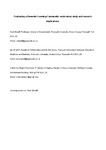Evaluating a Dementia Learning Community: exploratory study and research implications
| dc.contributor.author | Sheaff, Rod | |
| dc.contributor.author | Sherriff, I | |
| dc.contributor.author | Hennessy, C | |
| dc.date.accessioned | 2018-01-23T21:21:16Z | |
| dc.date.available | 2018-01-23T21:21:16Z | |
| dc.date.issued | 2018-02-05 | |
| dc.identifier.issn | 1472-6963 | |
| dc.identifier.issn | 1472-6963 | |
| dc.identifier.other | 83 | |
| dc.identifier.uri | http://hdl.handle.net/10026.1/10656 | |
| dc.description.abstract |
Background: Access times for, the costs and overload of hospital services are an increasingly salient issue for healthcare managers in many countries. Rising demand for hospital care has been attributed partly to unplanned admissions for older people, and among these partly to the increasing prevalence of dementia. The paper makes a preliminary evaluation of the logic model of a Dementia Learning Community (DLC) intended to reduce unplanned hospital admissions from care homes of people with dementia. A dementia champion in each DLC care home trained other staff in dementia awareness and change management with the aims of changing work routines, improving quality of life, and reducing demands on external services. Methods: Controlled mixed methods realistic evaluation comparing 13 intervention homes with 10 controls in England during 2013-15. Each link in the assumed logic model was tested to find whether that link appeared to exist in the DLC sites, and if so whether its effects appeared greater there than in control sites, in terms of selected indicators of quality of life (DCM Well/Ill-Being, QUALID, end-of-life planning); and impacts on ambulance call-outs and hospital admissions. Results: The training was implemented as planned, and triggered cycles of PDSA activity in all the intervention care homes. Residents' well-being scores, measured by dementia care mapping, improved markedly in half of the intervention homes but not in the other half, where indeed some scores deteriorated markedly. Most other care quality indicators studied did not significantly improve during the study period. Neither did ambulance call-out or emergency hospital admission rates. Conclusions: PDSA cycles appeared to be the more 'active ingredient' in this intervention. The reasons why they impacted on well-being in half of the intervention sites, and not the others, require further research. A larger, longer study would be necessary to measure definitively any impacts on unplanned hospital admissions. Our evidence suggested revising the DLC logic model to include care planning and staff familiarisation with residents' personal histories and needs as steps towards improving residents' quality of life. | |
| dc.format.extent | 0-0 | |
| dc.format.medium | Electronic | |
| dc.language | en | |
| dc.language.iso | en | |
| dc.publisher | BioMed Central | |
| dc.subject | dementia | |
| dc.subject | dementia learning community | |
| dc.subject | logic model | |
| dc.subject | Plan-Do-Study-Act | |
| dc.subject | unplanned admissions | |
| dc.subject | residential care | |
| dc.subject | England | |
| dc.title | Evaluating a Dementia Learning Community: exploratory study and research implications | |
| dc.type | journal-article | |
| dc.type | Journal Article | |
| dc.type | Research Support, Non-U.S. Gov't | |
| plymouth.author-url | https://www.webofscience.com/api/gateway?GWVersion=2&SrcApp=PARTNER_APP&SrcAuth=LinksAMR&KeyUT=WOS:000424121600003&DestLinkType=FullRecord&DestApp=ALL_WOS&UsrCustomerID=11bb513d99f797142bcfeffcc58ea008 | |
| plymouth.issue | 0 | |
| plymouth.volume | 18 | |
| plymouth.publisher-url | https://bmchealthservres.biomedcentral.com/ | |
| plymouth.publication-status | Published | |
| plymouth.journal | BMC Health Services Research | |
| dc.identifier.doi | 10.1186/s12913-018-2894-3 | |
| plymouth.organisational-group | /Plymouth | |
| plymouth.organisational-group | /Plymouth/Faculty of Health | |
| plymouth.organisational-group | /Plymouth/Faculty of Health/Peninsula Medical School | |
| plymouth.organisational-group | /Plymouth/REF 2021 Researchers by UoA | |
| plymouth.organisational-group | /Plymouth/REF 2021 Researchers by UoA/UoA20 Social Work and Social Policy | |
| plymouth.organisational-group | /Plymouth/Research Groups | |
| plymouth.organisational-group | /Plymouth/Research Groups/FoH - Community and Primary Care | |
| plymouth.organisational-group | /Plymouth/Research Groups/Institute of Health and Community | |
| plymouth.organisational-group | /Plymouth/Users by role | |
| plymouth.organisational-group | /Plymouth/Users by role/Academics | |
| plymouth.organisational-group | /Plymouth/Users by role/Researchers in ResearchFish submission | |
| dc.publisher.place | England | |
| dcterms.dateAccepted | 2018-01-23 | |
| dc.identifier.eissn | 1472-6963 | |
| dc.rights.embargoperiod | Not known | |
| rioxxterms.versionofrecord | 10.1186/s12913-018-2894-3 | |
| rioxxterms.licenseref.uri | http://www.rioxx.net/licenses/all-rights-reserved | |
| rioxxterms.licenseref.startdate | 2018-02-05 | |
| rioxxterms.type | Journal Article/Review |


